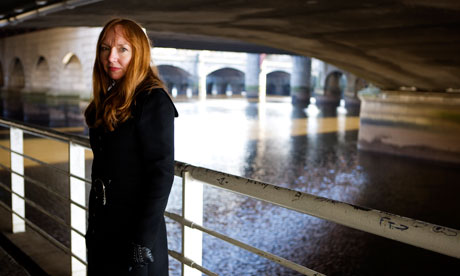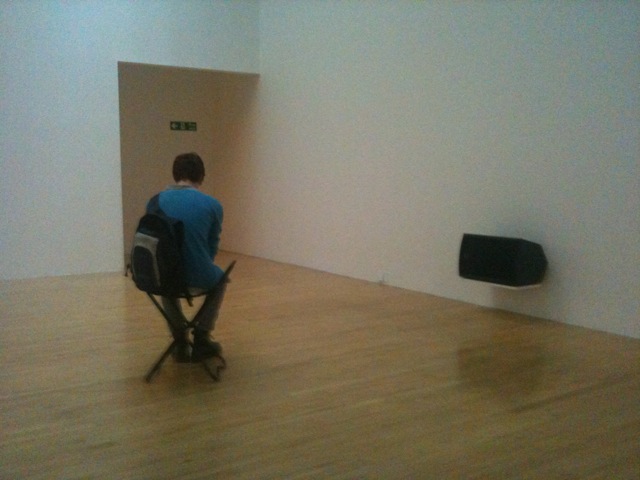
If you're hardy enough to brace London's icy cold snap and visit the 2010 Turner Prize exhibition at Tate Britain, don't be disappointed that there's no art to see when you get there.
The room dedicated to displaying the work of this year's winning artist is empty -- except for three speakers and a surprisingly comfortable wooden bench.
Expect, instead, to hear it. Britain's most prestigious art prize has been awarded, for the first time in its 26 year history, for a sound installation. Miuccia Prada, the Italian fashion designer, awarded the £25,000 ($40,000) prize money this week to Susan Philipsz, a Scottish artist living and working in Berlin who calls herself a sound sculptor.
Philipsz is only the fourth woman to be awarded the prize in its 26 year history. (Guerilla Girls take note.)

Turner prize winner Susan Philipsz under the bridges on Glasgow's River Clyde where her sound installation was played. Photo credit: Murdo Macleod
In the absence of visual information for distraction, people were entranced by Philipsz' sound installation, Lowlands, when I visited the exhibition this week. One art lover even brought his own chair, as if on a picnic or some sort of art safari, placed it in front of a speaker and sat on it listening intently, his eyes closed.

Lowlands is a voice recording of the artist singing a 16th-century lament for a drowned lover. Philipsz, who is from Glasgow, originally played the piece beneath three Glasgow bridges over the River Clyde with the sound of the trains trundling overhead. She recorded three different versions of the medieval Scottish folksong, one over each other, with each slightly stepped in timing from the next. The result of this displacement is a slightly jarring melody, which reinforces how song is used to bridge time, from then until now.
Presented in a gallery setting this conceptual artpiece becomes an intimate experience of sound in relation to space. Emotionally, the piece seems to have a calming, contemplative effect on the viewer -- or should I say listener? -- although overall the sound is also strangely haunting.
Ironically, on Monday, when the prize winner was announced, Philipsz' piece was drowned out by the chanting of more than 200 students demonstrating against proposed government cuts to culture and arts education.
Sir Nicholas Serota, Director of the Tate, was supportive of the demonstrators' cause and their right to protest. He said in an interview with the Guardian newspaper, "We know that Art schools have been the laboratories for Turner Prize winners... and the whole flowering of the arts in [Britain] over the last 30 years or more".
The prize carries prestige and the promise of commercial success. Previous winners include Howard Hodgkin, Rachel Whiteread, Anthony Gormley, Damien Hirst and Anish Kapoor.
Yet even to be shortlisted is a huge boost for an artist's career. This year Philipsz was the favorite to win but painter Dexter Dalwood, who had a well received show at Gagosian Gallery in Los Angeles this year, won the popular vote on the Guardian's online poll.
Angela de la Cruz, who last month won the £35,000 ($55,000) Paul Hamlyn award prize, was a favorite among critics for her crudely misshapen and then humorously reshaped monochrome paintings. The outsider was Otolith Group, a film making collective which presented so many video screens showing different footage and a chaotic semicircle of chairs for confused visitors that I thought I had walked into the United Nations mid-session.
The Turner Prize has frequently attracted controversy in the British media which ridiculed conceptual art with headlines such as "Call that art?". Memorably, in 1999, Tracey Emin's My Bed -- an installation of her unmade bed complete with dirty sheets and detritus -- was shortlisted for the Turner Prize and provoked an extreme critical response in the tabloid press.
Its notoriety has persisted and, just as My Bed helped the so-called "Young British Artists" to rise to fame, so Philipsz has been hailed for putting her hometown Glasgow on the map for being a hotbed of contemporary art talent -- even if she does now live in Berlin.
